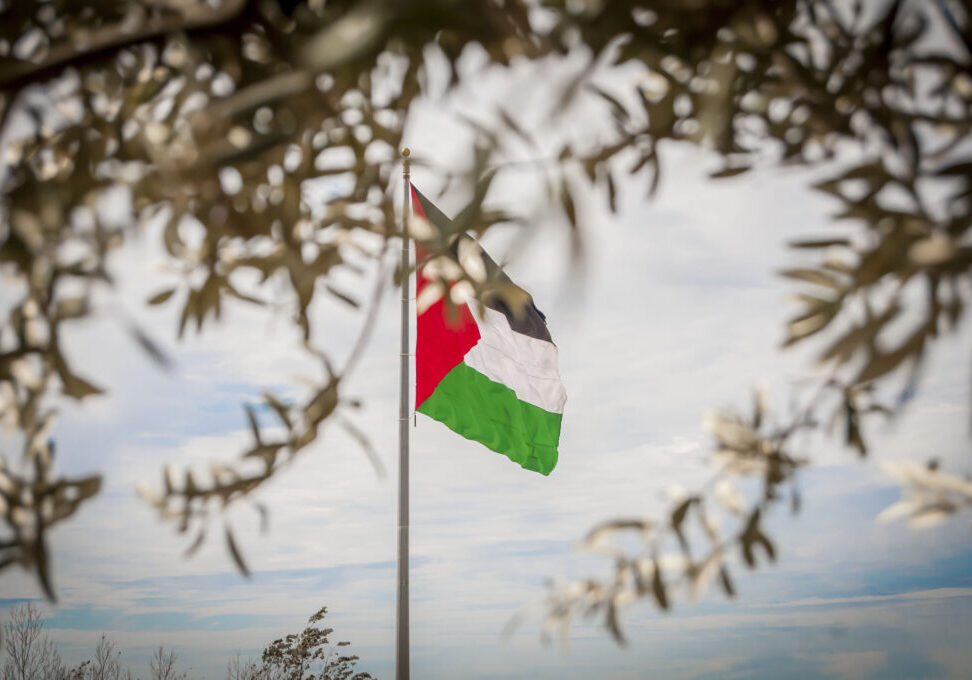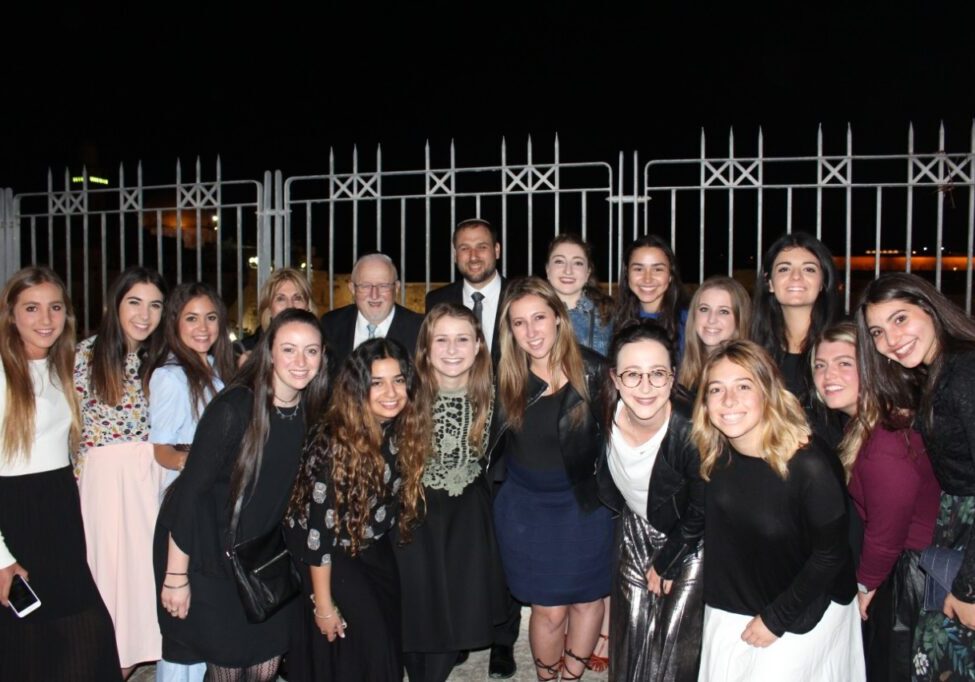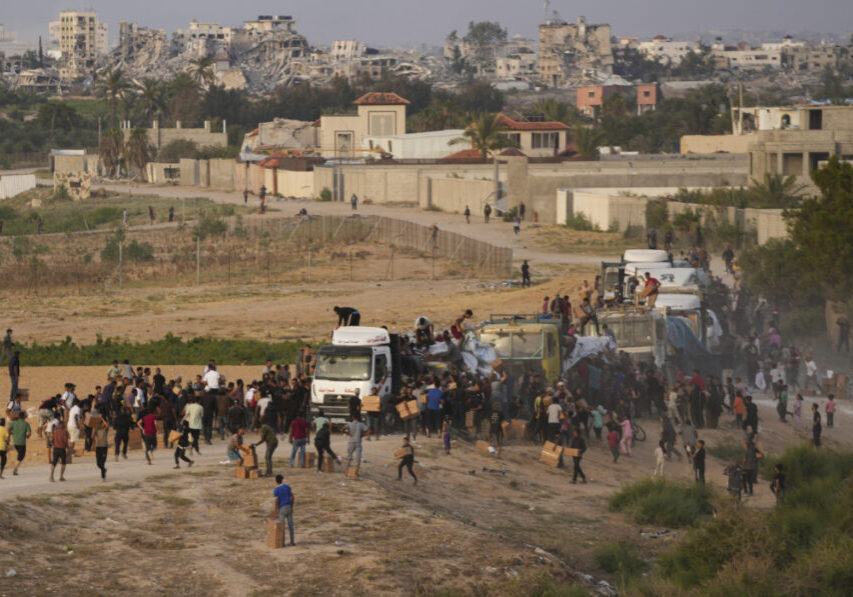Australia/Israel Review
Noted and Quoted – September 2018
Sep 5, 2018 | AIJAC staff

Tears for the truth
Olfat Mahmoud, who was born in 1958 in a Lebanese refugee camp for Palestinians displaced during the 1948 Arab-Israeli war, visited Australia to promote her book Tears for Tarshiha, which shares her family’s story.
She told ABC Radio National “Sunday Extra” (July 29) host Hugh Riminton that her grandfather was forced to “leave at gunpoint” from the Galilee village of Tarshiha. He “thought that it will be for only a couple of weeks and then we will return back,” she said.
What listeners were not told was that the village of Tarshiha became embroiled in the fighting because the Arab Liberation Army was headquartered there.
Mahmoud claimed UN General Assembly Resolution 194 gives her a right to return to Tarshiha but it is not “activated”.
Resolution 194, passed in December 1948, is an advisory resolution with no legal standing, was heavily qualified and did not refer specifically to Palestinian Arabs displaced. Moreover, 194 was initially opposed by Arab countries who saw its acceptance as recognising Israel’s existence.
Furthermore, Mahmoud’s refugee status exists only because the UN has decided that, uniquely among all refugees in the world, Palestinians can inherit refugee status from their parents, even they hold citizenship elsewhere, as do many of the millions of Palestinians claiming to be refugees.
She said disingenuously that Muslims, Christians and Jews “used to live together in Palestine, why not now?”
Maybe because the Arab leadership in Mandatory Palestine and in surrounding countries refused all entreaties by the Jewish community there to find a peaceful solution, including accepting the 1947 UN Partition Plan that would have ensured no Arabs became refugees. Instead, to quote the Arab League chief Azzam Pasha, they pursued a “war of extermination” in 1948 which failed and resulted in refugees on both sides, but of course more on the losing Arab side than the winning Jewish one.
Moreover, the contemporary so-called Palestinian refugee problem is a direct result of the cruel policy of countries like Lebanon and Syria of denying citizenship or the right to work, study or access health services for the descendants of the original Palestinian refugees.
Listeners heard none of this vital context.
A feature on Mahmoud in the Daily Telegraph (Aug. 4) similarly lacked historical clarity. In the same edition of the paper, “Saturday Extra” editor Martin Newman penned an op-ed referencing Olfat Mahmoud. He heavily criticised Israel for its treatment of Palestinians but qualified that by denying they “compare with Nazi Germany”.
Immoderately wrong
Deakin University academic Prof. Shahram Akbarzadeh’s depiction of the Trump Administration’s reimposition of sanctions on Iran as a threat to the regime’s moderates led by Iranian President Hassan Rouhani failed the credibility test.
According to Akbarzadeh, “Rouhani has been criticised by his hard-line critics for giving up too much control over Iran’s nuclear program to secure a deal in 2015. With Trump’s decision to withdraw from the deal despite confirmation by the International Atomic Energy Agency that Iran has been compliant with its agreed obligations, Rouhani’s critics have doubled their attacks, asking for his resignation. Even the Supreme Leader Ali Khamenei, who tries not to be drawn into factional fighting, made a public statement to say the US decision was a ‘defeat’ for Rouhani,” Age, Sydney Morning Herald (Aug. 2).
Wake up call
AIJAC’s Colin Rubenstein offered Age, Sydney Morning Herald and Canberra Times readers a more nuanced perspective on President Rouhani (Aug. 13), explaining that “Rouhani is no moderate – he has been intimately tied to Iran’s nuclear program for two decades, and boasted in 2015 about using negotiations as cover to advance Iran’s nuclear efforts. He also lacks direct control over foreign or defence policy – that policy is determined by Supreme Leader Ayatollah Ali Khamenei, a hardliner who has tight control over who is allowed to run for the presidency. Iran signed the nuclear deal in 2015 because Khamenei decided it was in Iran’s interests to do so – not because the ‘moderate’ Rouhani won an election. And he did so both because of external pressure, and because the Obama Administration, desperate for a deal, made him an attractive offer which all but guaranteed Iran would be allowed to build nuclear weapons after 2025.”
Rubenstein welcomed recent moves by Australia to express concerns over Iran’s “recent military aggression and ongoing missile development,” but he said more needs to be done, especially going forward as Washington increases economic pressure on Iran to bring it to the negotiating table.
Earlier, the Australian Financial Review’s (Aug. 8) Andrew Tillett reported that the Australian Government ruled out introducing an EU-style “blocking statute” to circumvent US warnings against European companies seeking to do business with Iran. The same day, the Australian editorialised on Britain, Germany and France’s “naive and unrealistically narrow view” that the nuclear deal with Iran “is working” given the “wider context of Tehran’s gross misbehaviour across the Middle East.”
Misfortune follows mismanagement
The ABC provided some welcome reality checks against claims the policies of US President Donald Trump are responsible for Iran’s current economic difficulties.
Chatham House associate fellow Sanam Vakil explained that Iranians are disappointed not just with “America’s policy toward Iran but also with the legitimacy crisis that is really at the heart of these issues where the Islamic government has failed in providing economic justice and growth and employment to the population and you hear in the chants in all these protests that people are challenging the Supreme Leader,” ABC Radio National “Saturday Extra” (Aug. 4)
Earlier, International Crisis Group’s Ali Vaez said, “The Iranian economy has been suffering as a result of years of mismanagement and corruption, which is endemic in Iran. The US sanctions have just exacerbated the situation but they are not the real cause of the current economic difficulties,”ABC Radio National “Late Night Live” (Aug. 1).
Headline ache
The Age and Sydney Morning Herald headlined an otherwise reasonable report (Aug.10) on a flare up between Hamas and Israel with the title “Mother and child killed by air strike.” This was later changed after complaints were made that it was inflammatory in overlooking the context of the deaths, which was that Hamas and other terror groups had fired approximately 180 rockets and mortars at Israel.
The report from New York Times Middle East correspondent Isabel Kershner was originally titled “Renewed fire between Israel and Gaza interrupts talk of ceasefire” in that paper.
On the papers’ respective websites, the story title was amended to the similar headline “Talk of ceasefire between Israel, Hamas interrupted by cross-border fire.”
In contrast, the Australian went with “Israel airstrikes hammer Gaza after barrage of Hamas rockets” and even the consistently anti-Israel Guardian Australia opted for “‘Terrifying night’ as Israel and Hamas trade airstrikes and rocket attacks”.
The Roth of Ken
A profile of Human Rights Watch director Ken Roth in the Australian Financial Review’s August 2018 “Boss” magazine paid lip service to the organisation’s pathological obsession with Israel.
The report quoted Roth talking extensively of his Jewish father’s persecution in Nazi Germany and saying, “When I started, Human Rights Watch was pretty narrowly focused on US policy toward the world. We’ve been able to build a global organisation which now is addressing human rights problems in some 90 countries.”
Roth is distorting the historical record.
In 2009, HRW founder Robert Bernstein publicly denounced his successor in the New York Times, writing that the organisation’s “original mission [was] to pry open closed societies, advocate basic freedoms and support dissenters… we always recognised that open, democratic societies have faults and commit abuses. But we saw that they have the ability to correct them – through vigorous public debate, an adversarial press and many other mechanisms that encourage reform.”
He also noted that “when I stepped aside in 1998, Human Rights Watch was active in 70 countries, most of them closed societies” a total actually pretty similar to the 90 countries Roth now claims credit for monitoring.
Bernstein also attacked Roth on HRW’s handling of the Middle East which “is populated by authoritarian regimes with appalling human rights records. Yet in recent years Human Rights Watch has written far more condemnations of Israel for violations of international law than of any other country in the region.”
Roth proudly claimed in the profile that “all of [our] funding comes from private donations because HRW doesn’t accept any money from governments.”
But as pro-Israel advocacy group NGO Monitor director Dr. Gerald Steinberg noted in a published letter on AFR’s website, “In 2009, Roth secretly sent the head of HRW’s Middle East desk to raise funds in Saudi Arabia, not to address blatant violations in this closed kingdom, but to counter ‘pro-Israel pressure groups in the US, the European Union and the United Nations.’”
Carr’s blind spot
Australian associate editor Brad Norington’s review (Aug. 4) of Bob Carr’s latest literary offering, Run for Your Life, pointed out the hypocrisy of the former foreign minister’s unhinged criticism of Israel and fawning advocacy for China.
As Norington notes, “Carr devotes a chapter to… his transformation from early enthusiast of the ‘Israel lobby’ to a trenchant critic… Now heading a Sydney-based China think tank, Carr… insists Australia must engage with China, not be deterred by a ‘whispered word’ from security agencies about Beijing’s broader agenda. Carr… seems to confuse what he regards as an ‘anti-China’ sentiment and ‘elements desperate for China to fail’ with legitimate scrutiny of its behaviour as a one-party state. He glosses over or ignores Beijing’s disregard for the rule of law and human rights. They are downplayed as ‘the disappointments’ China provides ‘from time to time’. Maybe it’s not China, Bob. Maybe it’s the Chinese Communist Party. Carr criticises Israel, but not China. His naivety, or whatever, is puzzling.”
And maybe one should add to the list of Carr’s blind spots the reality that Israel has made repeated offers of a Palestinian state that have been rejected or ignored by its Palestinian interlocutors. No similar demonstrations of willingness to compromise and seek peace can be identified in China’s approach to Tibet or Taiwan, for instance.
Greg goes viral
Columnist Greg Barns used a decision by Australia to deny visas to a one-time jihadist fighter and an anti-vaccination campaigner as an excuse to indulge in yet another vitriolic tirade about Israel.
According to Barns, “the denial of freedom of speech which is implicit in these actions is deplorable” especially when the “Turnbull government… allowed Israeli Prime Minister Benjamin Netanyahu to visit last year. This is the leader who is responsible for the killing of innocent men, women and children who are forced to endure statelessness and perpetual impoverishment on the West Bank and Gaza Strip. This is the Prime Minister who routine [sic] breaches international law by allowing illegal settlements to be built by Jewish settlers. The ALP feted Mr Netanyahu just as slavishly as did the Turnbull Government,” Mercury (Aug. 6).
A free pass
Israeli journalist Ronen Bergman’s new book Rise and Kill First, on Israel’s use of targeted assassinations saw the Australian newspaper’s Jamie Walker (Aug. 11) focus on the fallout in 2010 following the disclosure that Israeli agents used forged Australian passports as cover to kill senior Hamas operative Mahmoud al-Mabhouh in Dubai.
According to Walker, “The diplomatic ructions between Israel and Australia would ricochet for years… In the aftermath…Kevin Rudd’s Labor government expelled the Mossad liaison officer based at the Israeli embassy in Canberra. Australia changed its vote in the UN from opposing a war-crimes investigation into Israel’s 2009 military incursion into Gaza to abstention…. Rudd… went after the Israeli PM in February last year during Netanyahu’s historic visit to Australia. Accusing Netanyahu of ‘torpedoing’ what was left of the two-state process, Rudd said: ‘No apology has ever been received for that action which had the consequence of putting Australian passports and the security of Australian passport holders travelling to the Middle East at risk.’”
While one can question the prudence of forging passports, readers would have been better served if the article had included then opposition foreign affairs spokesperson Julie Bishop’s widely reported observation that “It would be naive to think that Israel is the only country in the world that has used forged passports, including Australian passports, for security operations.”
Walker acknowledged electoral considerations in Western Sydney also played a factor in the ALP’s shift away from Israel, but too readily accepted Rudd’s view that Israel is solely to blame for the lack of a Palestinian state, and implied these views are somehow related to the 2010 Dubai affair.
Kennard versus canards
Rabbi James Kennard argued that Israel’s controversial Jewish nation state law merely “states the obvious,” pointing out that “there are many other developed nations that make their religious or national identity clear, without being accused of disadvantaging or discriminating against adherents of other religions or bearers of other national identities.”
Britain’s “national anthem is a religious hymn [and] senior bishops are automatically members of parliament”; the Irish, Norwegian and Greek constitutions affirm the centrality of Christianity to the nation’s intrinsic makeup “and let’s not overlook the numerous states that call themselves Islamic, apply Islamic law and do indeed deny rights to non-Muslims, whilst managing to escape any opprobrium.”
The law’s sole restriction, he wrote, is to arrogate to the Jews a national right of self-determination meaning “non-Jews are denied… the right to end the existence of the world’s sole Jewish state by making it into something else.”
Further, he noted that “the new law protects the status of minorities far more than the constitutions of other ‘liberal’ countries do. Non-Jews have a right to maintain days of rest on their Sabbaths and festivals (unlike the situation in, say, Australia, whereby Jews and Muslims have to use annual leave in order to observe their holy days),” Spectator Australia (Aug. 4).
Demolition orders
Temporary ABC Middle East correspondent Sean Rubinsztein-Dunlop’s report on a demolition order by Israel’s Supreme Court for the illegally built Bedouin village Khan al-Ahmar in the West Bank was a showcase of pro-Palestinian propaganda.
Rubinsztein-Dunlop said, “this village sits at the centre of the struggle for a Palestinian state. If Israeli settlers push into this area, they’ll split the occupied West Bank in two, blocking Palestinians from their desired capital east Jerusalem.”
This is hyperbole and an easily debunked myth and in 2012, the New York Times had to issue a correction after saying almost exactly the same thing.
Anyone looking at a map can see the absurdity of the claim, with there being at least 15 kilometres between Khan al-Ahmar and the border with Jordan at its narrowest point.
The village would almost certainly become part of Israel under any peace deal, given how close it is to the major settlement block of Maale Adumim and the territory east would most likely become incorporated into a Palestinian state. Furthermore, access to east Jerusalem is not restricted by which side controls this one geographic point.
Rubinsztein-Dunlop’s assertion that “Khan al-Amar was built more than 60 years ago, when the Bedouin were expelled from the Negev Desert by the Israeli army” is also disputed. One account claims an inter-tribal feud in the early 1970s prompted the village’s creation, and satellite photos from the late 1960s show the area was almost empty at that time.
The report also failed to make it clear that Israel has no intention of making the villagers homeless and has negotiated with village leaders over alternative sites and compensation for a decade, but the Palestinian Authority has pressured the residents to refuse to accept, ABC TV “7pm News” (Aug. 10).
Corrections welcome
Following an AIJAC complaint, the ABC corrected an online article erroneously claiming Australia had listed Hamas and the Palestinian Islamic Jihad as terror groups “for their continued resistance against Israeli occupation.” The piece now states they are “designated for their attacks on Israeli citizens”.
SBS also upheld a complaint made by AIJAC concerning a segment on Gaza border clashes broadcast on SBS Arabic 24 “Good Morning Australia” program on April 2, 2018 which featured one-sided and factually inaccurate comments by its Gaza-based SBS correspondent Sharief Nearab (see AIR May 2018 for the details on that story).
Tags: Australasia, Australia, Media/ Academia






